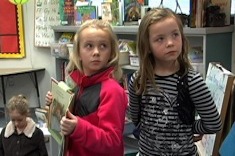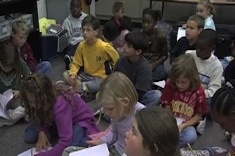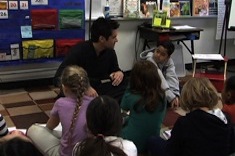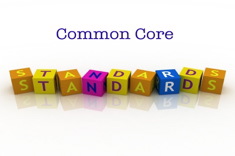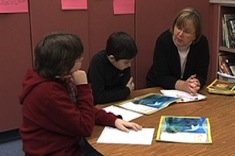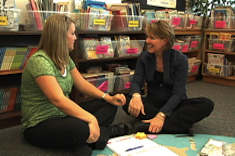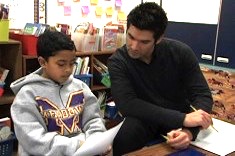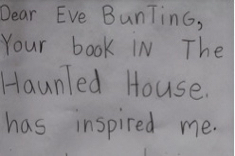Library
Choice Literacy Articles & Videos
The Choice Literacy library contains over 3,000 articles and 900 videos from 150+ contributors. Classic Classroom and Literacy Leadership subscribers have access to the entire library. Content is updated continuously, with five to six new features published each week.
Latest Content
Good News: Your Teacher is Calling
Heather Rader and Jennifer Taft share strategies for positive communication with parents.
The Big Fresh October 13, 2012 More More More
Parent communication is the focus of this week’s Big Fresh.
Book Memories
Jennifer Schwanke finds connections between her childhood, teaching, and school leadership in this heartwarming essay.
Opening Doors to Parents in Middle School
Gretchen Taylor finds middle school parents enjoy hearing about their child’s day — it’s just a matter of getting creative in dealing with the large number of families.
Writing Workshop: Preparing for Publication
Beth Lawson helps her fourth-grade students work through a checklist of items to prepare for publishing early in the fall.
The Big Fresh October 6, 2012 Future Literacy
This week we tackle grammar and conventions in the Big Fresh.
Concise, Conversational, and Consistent: Explaining the Work of Literacy Coaches
Heather Rader shares the language she uses to describe literacy coaching to others.
Launching a Punctuation Study in Second Grade
Linda Karamatic is launching a unit on punctuation with her second graders which includes mentor texts, inquiry, and anchor charts.
Finding a Fit (The Power of Conventions Series)
Heather Rader works with a teaching team as they integrate conventions instruction into their writing workshop.
From Reading to Writing Informational Texts
Aimee Buckner makes some surprising discoveries about what types of texts support writers working in nonfiction genres.
Enlisting a Student as Coteacher
In this second video in a two-part series, Sean Moore invites second grader Isaiah to present his learning to the class.
The Big Fresh September 29, 2012 Shining a Light
The web is a treasure trove of resources for the Common Core.
Trust
Mary Lee Hahn reminds herself (and us!) of the qualities we have that inspire trust in ourselves and our ability to teach well.
Unpacking the Kindergarten Common Core Standards
Mandy Robek shares five tips that can help teachers at any grade level develop strategies for tackling the Common Core.
Supporting Young Writers with Opinion Texts
Katie DiCesare considers how different texts at the primary level can support student understanding of standards for opinion and argumentative writing.
Chronology in Nonfiction (Common Core Booklist)
Franki Sibberson's latest Common Core booklist includes texts to help students master chronology in nonfiction.
Do They Care? Empathy Book Clubs
Do they care? That’s the question Karen Terlecky asks herself as she sets up book clubs in her fifth-grade classroom with a focus on empathy.
Shifting from Spelling to Word Study in 5th Grade
Maria Caplin explains how she made the shift from spelling to word study in the intermediate grades.
The Blank Page and Better Teaching
Aimee Buckner learns some important lessons about how images and words work together for student writers when she moves between second- and fifth-grade classrooms.
The Joys and Challenges of Co-Teaching
Katherine Sokolowski explores the challenges and joys of co-teaching with special education colleagues.
Conferring to Coteaching
In this first video in a two-part series, Sean Moore confers with second grader Isaiah. Sean prepares Isaiah to share what he is learning later in the writing workshop.
The Big Fresh September 22, 2012 Going Through the Motions
This week’s Big Fresh includes lots of resources for integrating reading and writing into your science curriculum.
The Big Fresh September 15, 2012 Delegation Gone Bad
Launching and sustaining writing workshops is the topic of this week’s Big Fresh.
Revising My Recording Form for Writing Conferences
Mandy Robek shares how she has revised the records she keeps during writing conferences.
Appealing Book Displays for Boys
Are your book displays enticing to the boys in your classroom? Tony Keefer has suggestions for making classroom libraries more appealing.
On Perfection and Goals
Ruth Ayres explains how she sets realistic goals for her own learning during the year.
Without Answers
English language learners may have some of the quietest voices in schools. In this poem and narrative, Stella Villalba shares the power of finding ways to bring those voices out in your classroom.
The Big Fresh September 8, 2012 Something Better
Improving read alouds is the topic of this week’s Big Fresh.
Dear Eve Bunting
A persistent seven-year-old has some powerful messages about confidence, patience, and sending writing out into the world.
The Power of Music
What can music add to the classroom? Plenty! Sean Moore and Heather Rader provide many examples and favorite tunes.
Browse Content By
Type
Category
- Assessment Tools
- Big Fresh Archives
- Booklists
- Choice Numeracy
- Classroom Design
- Common Core
- Community Building
- Conferring
- Content Literacy
- Digital Literacy
- English Language Learners
- Equity
- Family Relations
- Free Samples
- Guiding Groups
- Leadership
- Literacy Coaches
- Mentor Texts
- Minilessons
- New Teacher Mentors
- Podcasts
- Poetry
- Quote Collections
- Reading Strategies
- Self Care
- Struggling and Striving Learners
- Talking and Listening
- Teacher Study Groups
- Teaching Reading
- Teaching Writing
- Word Study and Vocabulary
Author
- Melissa Quimby
- Nawal Qarooni
- Gwen Blumberg
- Julie Cox
- The Lead Learners
- Hannah Tills
- Josie Stewart
- Ruth Metcalfe
- Mallory Messenger
- Becca Burk
- Jodie Bailey
- Vivian Chen
- Mary Brower
- Tiffany Abbott Fuller
- Stephanie Affinito
- Ruth Ayres
- Leigh Anne Eck
- Heather Fisher
- Shari Frost
- Julie Johnson
- Suzy Kaback
- Gigi McAllister
- Shirl McPhillips
- Melanie Meehan
- Cathy Mere
- Debbie Miller
- Tara Barnett and Kate Mills
- Tammy Mulligan
- Dana Murphy
- Bitsy Parks
- David Pittman
- Brenda Power
- Heather Rader
- Matt Renwick
- Mandy Robek
- Christy Rush-Levine
- Gretchen Schroeder
- Jen Schwanke
- Brian Sepe
- Katherine Sokolowski
- Stella Villalba
- Jennifer Vincent
Grade Level
Choice Literacy Membership
Articles
Get full access to all Choice Literacy article content
Videos
Get full access to all Choice Literacy video content
Courses
Access Choice Literacy course curriculum and training







